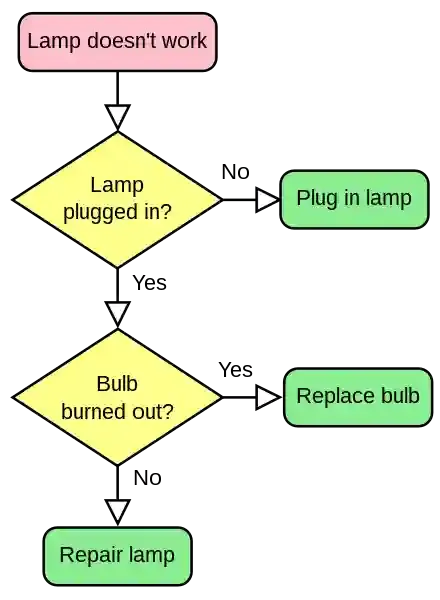 |
| Sample flowchart representing a decision process when confronted with a lamp that fails to light/Wikipedia. |
IN BRIEF:
- By understanding our evolutionary roots and employing critical thinking strategies, we can navigate the complexities of decision-making more effectively.
- Incorporating insights from various disciplines, reflecting on mistakes, and embracing uncertainty ultimately contribute to better decision-making and personal growth.
Introduction:
Human behavior and decision-making tendencies can often be traced back to our evolutionary history as hunter-gatherers. Having spent the majority of our existence in that state, our biological makeup still retains certain inclinations that shaped our survival instincts.
This article delves into various quotes and principles from notable thinkers, including Upton Sinclair, Warren Buffet, Richard Feynman, and others, to explore aspects of human nature, decision-making, and the pursuit of better thinking. Refer to this link for quotes mentioned in the article.
Drawn to Novelty and Avoiding Self-Deception:
Our attraction to novelty stems from the potential rewards associated with exploring the unknown. This innate curiosity can serve us well, but it's essential to avoid self-deception and remain grounded in reality.
Upton Sinclair's quote highlights the difficulty of understanding new concepts when our biases or personal interests are at stake. Similarly, Feynman emphasizes the importance of not fooling oneself and being aware of personal limitations.
Fast Judgments and Fear of Being Wrong:
Humans tend to make quick judgments and then doubt themselves when faced with conflicting information. The fear of being wrong or making mistakes often drives our decision-making process.
Seneca's insight encourages flexibility in changing plans when circumstances change, reminding us that adaptation is key.
Importance of Facts and Goals:
Acknowledging the existence of facts, even if ignored, is crucial in making informed decisions. Warren Buffet's quote advises against blind trust in financial projections, emphasizing the significance of objective information.
Additionally, having a clear understanding of personal goals and motivations, whether emotional or rational, helps align decision-making with desired outcomes.
Seeking Contrarian Opinions and Individual Thinking:
The Noah Principle suggests that predicting unfavorable outcomes is insufficient; taking proactive measures is essential. People tend to prefer consensus over individual correctness, but it's beneficial to challenge groupthink.
Postponing decisions until a well-founded argument against them arises encourages independent and critical thinking.
Evaluating Experts and Memory Biases:
When faced with complex ideas, we often assume that experts are smarter when we lack understanding.
However, it is crucial to question and comprehend information independently. The 7 Sins of Memory shed light on memory biases and the impact they have on decision-making.
Systemic Thinking and Identifying Key Factors:
To mitigate unintended consequences, it's important to consider the interconnectedness of factors within a system.
Over-optimizing one variable can lead to suboptimal performance overall. By identifying key factors and understanding their interactions, we can make more informed decisions.
Embracing Uncertainty and Reflecting on Mistakes:
Uncertainty can be uncomfortable, but it is necessary for growth and learning. Bertrand Russell's quote emphasizes the need to endure uncertainty without relying on comforting illusions.
Conducting post mortems allows us to reflect on our judgment errors, reevaluate assumptions, and make improvements in future endeavors.
Tools for Better Thinking:
Developing a toolkit for better thinking involves cultivating a range of models and concepts across different disciplines.
By constructing simple one-sentence explanations for complex ideas and continuously asking "why," we deepen our understanding of reality.
Inverting problems and considering their opposites can lead to fresh insights and innovative solutions.
Ethical Considerations and Living in the Present:
Considering the potential public scrutiny of our actions encourages ethical decision-making.
Living in the present, rather than dwelling on the past or worrying about the future, enables focus and clarity in decision-making processes.
Continuous Learning and Application:
Munger's advice emphasizes the importance of learning fundamental concepts and integrating them into our thinking.
Actively engaging with knowledge and ensuring its practical application helps build a repertoire of effective mental models.
